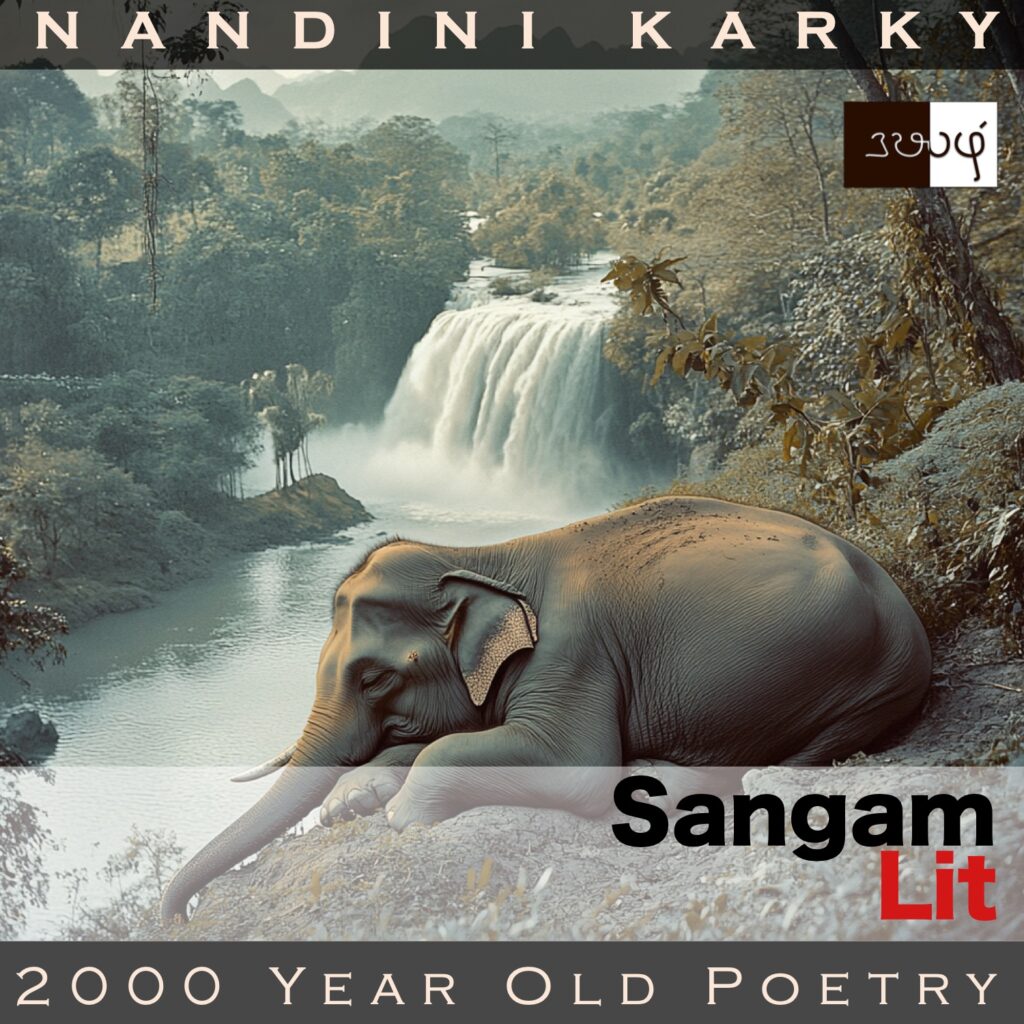Sangam Lit

Kalithogai 42 – Radiant rays of trust
In this episode, we perceive the lady’s trust in the man, as depicted in Sangam Literary work, Kalithogai 42, penned by Kabilar. The verse is situated in the ‘Kurinji’ or ‘Mountains landscape’ and relates a joyous incident in the lady’s life.

வள்ளைப் பாட்டுப் பாடத் தோழி அழைக்க, தலைவி இசைதல்
‘மறம் கொள் இரும் புலித் தொல் முரண் தொலைத்த
முறம்செவி வாரணம் முன் குளகு அருந்தி,
கறங்கு வெள் அருவி ஓலின் துஞ்சும்
பிறங்கு இருஞ் சோலை நல் மலை நாடன்
மறந்தான்; மறக்க, இனி; எல்லா! நமக்குச்
சிறந்தமை நாம் நன்கு அறிந்தனம், ஆயின்; அவன் திறம்,
கொல் யானைக் கோட்டால் வெதிர் நெல் குறுவாம் நாம்,
வள்ளை அகவுவம், வா’ ‘இகுளை! நாம்
வள்ளை அகவுவம், வா’
தோழி இயற்பழித்தல்
காணிய வா வாழி, தோழி! வரைத் தாழ்பு
வாள் நிறம் கொண்ட அருவித்தே, நம் அருளா
நாணிலி நாட்டு மலை
தலைவி இயற்பட மொழிதல்
ஆர்வுற்றார் நெஞ்சம் அழிய விடுவானோ
ஓர்வு உற்று ஒரு திறம் ஒல்காத நேர்கோல்
அறம் புரி நெஞ்சத்தவன்?
தோழி
தண் நறுங் கோங்கம் மலர்ந்த வரையெல்லாம்
பொன் அணி யானை போல் தோன்றுமே நம் அருளாக்
கொன்னாளன் நாட்டு மலை
தலைவி
கூரு நோய் ஏய்ப்ப விடுவானோ? தன் மலை
நீரினும் சாயல் உடையன், நயந்தோர்க்குத்
தேர் ஈயும் வண் கையவன்
தோழி
வரைமிசை மேல் தொடுத்த நெய்க் கண் இறாஅல்
மழை நுழை திங்கள் போல் தோன்றும் இழை நெகிழ
எவ்வம் உறீஇயினான் குன்று
தலைவி
எஞ்சாது, எல்லா! கொடுமை நுவலாதி
அஞ்சுவது அஞ்சா அறனிலி அல்லன், என்
நெஞ்சம் பிணிக்கொண்டவன்
என்று யாம் பாட, மறை நின்று கேட்டனன்,
தாழ் இருங் கூந்தல் என் தோழியைக் கை கவியா,
சாயல் இன் மார்பன் சிறு புறம் சார்தர,
ஞாயிற்று முன்னர் இருள் போல மாய்ந்தது, என்
ஆயிழை மேனிப் பசப்பு!
Although the verse is another musical exchange between the confidante and lady, the roles are reversed here. The words can be translated as follows:
Confidante’s request to the lady:
Ending the old enmity of the huge and brave tiger, the elephant having ears like a winnow, feeds on herbs and grass in front, and sleeps in the sound of the descending, white cascade, in the huge and lush forests of the mountains, ruled by the lord. He has forgotten me; Let it be so! But we know well what he has rendered; And so, let us sing of his traits, as we pound the bamboo rice with the fierce elephant’s tusk, in a ‘vallai’ song. Come my friend, let’s sing a ‘vallai’ song together:
Confidante’s words:
Come and see, my friend, may you live long! How do the white-hued cascades descend down the mountains of the shameless one, who does not render his grace?
Lady’s response:
Will he let the heart of the one whom he loves be ruined? For he is one with a heart filled with unswerving justice, like the needle of a scale that does not bend to one side unfairly.
Confidante’s words:
How do the moist and fragrant buttercup flowers bloom all around the ranges, making it appear like an elephant, clad in golden ornaments in the mountain of the cruel one, who does not render his grace?
Lady’s response:
Will he let me be as this piercing disease tortures? He is one sweeter than the water in his mountain, one who has the generous hands to render chariots to those, who come seeking to him with desire.
Confidante’s words:
How do the honeycombs, filled with nectar, cover the hill tops, appearing like a cloud-covered moon in the mountain of the tormenting one, who made your jewels slip away?
Lady’s response:
Don’t, my friend! Don’t speak ill of him unceasingly! He is not an unjust person, who fears not what needs to be feared, the one who has captured my heart.
And so, as we sang all this, he was listening to it, hidden by the hedge. Then, gesturing my friend with dark and low-lying tresses to move away, the sweet-chested man stepped up and embraced me from behind. When he did that, akin to how darkness dissipates in front of the sun, so vanished the pallor on my beautiful, jewel-clad skin!”
Time to delve into the details. The verse is situated in the context of a man’s love relationship with a lady, prior to marriage, and specifically at a time, when the man had parted away from the lady for a while. The words are said by the lady and the confidante, with the lady’s conclusion, for a change. The confidante starts as custom by singing about the man’s mountain country, where an elephant has fought and won over a tiger, and after feeding on the grass, was now sleeping in the sound of the waterfalls. Describing the man’s country so, the confidante requests that she and the lady should sing about the traits of the man, as they pound the bamboo rice with an elephant tusk.
Differing from the previous verses, the confidante takes the role of the ‘bad cop’ and starts wondering how the cascades can flow, the buttercups can bloom, honeycombs can cover the mountains of the man, who has shamelessly and cruelly abandoned the lady! The lady refutes each piercing insult by the confidante and declares that the man will not let her heart be ruined, he will not stay away with apathy as the love affliction torments her, and talks of him as one who is always just, sweeter than the waters of his mountains, and generous to render chariots to those who come seeking. If he’s so kind to strangers, would he forsake me, the one who loves him so?, the lady asks. Then, she relates how, as they were singing so, the man was listening to all this and then asked the confidante to move away, and came there to embrace her from behind. Just then, like how darkness instantly vanishes the moment the sun enters the scene, the pallor on her skin too vanished, when the man embraced her, the lady concludes. Here’s a sweet song, wherein we see the trust in a man’s love glow in the words of his lady!






 Visit Podcast Website
Visit Podcast Website RSS Podcast Feed
RSS Podcast Feed Subscribe
Subscribe
 Add to MyCast
Add to MyCast